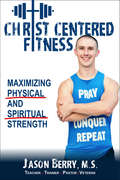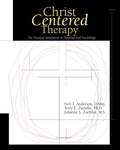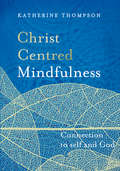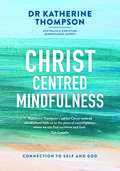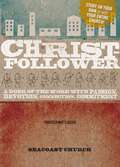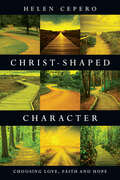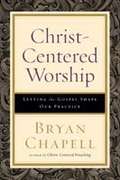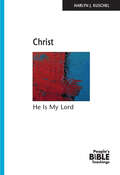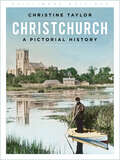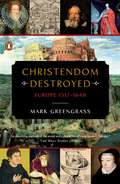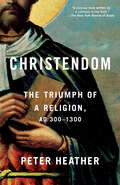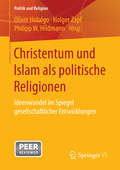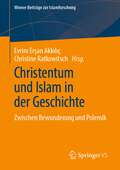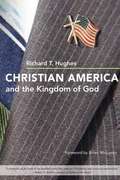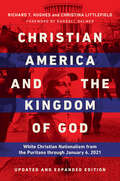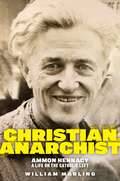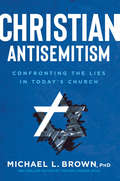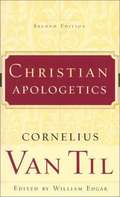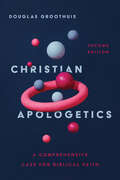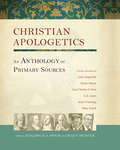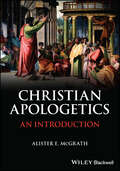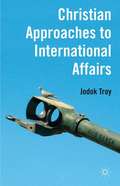- Table View
- List View
Christ-Centered Fitness: Maximizing Physical and Spiritual Strength
by Jason BerryYou are a unique creation…no one can take your place. It’s time to take your life OFF OF HOLD and seize victory in every aspect of life with Christ-Centered Fitness.God has specifically called you to do mighty things for Him, but are you prepared to maximize that calling with a fit body? Your body is the vessel by which you preach the gospel, serve others, and live out your abundant life. This vessel needs to be healthy!With shackles such as low energy, obesity, sickness, and sedentary lifestyles, people feel restricted and incapable of serving the Lord to the best of their ability.Jason Berry shows you how to achieve a state of physical fitness and health that is readily prepared to accomplish the will of the Father. In his easy-to-understand style, he outlines everything needed from Biblical fundamentals to workout plans. You’ll discover ways to win the battle inside your mind, overcome by faith, Biblical truths for health—all at your fingertips.This is YOUR appointed time for victory. Grab a water bottle, double-knot your sneakers, break the shackles, and claim your place…it’s time for Christ-Centered Fitness!“This book fills a niche for Christians' health and shows God’s intention for His followers.” ~Patricia London (D. Ed. Adjunct Assistant Professor, Health and Physical Education, Messiah College)“Jason uses Biblical truths to present a fresh Christian perspective to physical fitness.” ~James Smith (Retired Supervisor of Health, Physical Education, and Aquatics, Cumberland Valley School District)About the AuthorDynamic speaker, youth pastor, PE teacher, U.S. Military veteran, and certified personal trainer, Jason Berry's diverse fitness experience ranges from Iraq's battlefields to a master's degree in Exercise Science. His passion for fitness is surpassed only by his passion for Christ and his family.
Christ-Centered Therapy: The Practical Integration of Theology and Psychology
by Neil T. Anderson Julie Zuehlke Terry E. ZuehlkeDepending on whom you ask, the term Christian counseling can mean anything from secular psychology practiced by a Christian to biblical counseling that completely shuns psychological insights. Christ-Centered Therapy thoroughly integrates psychology and practical theology. A book written by experts from both fields, it utilizes the contributions of science in an uncompromisingly biblical framework. Here at last is a powerful resource to help you—pastor, counselor, or spiritual advisor—understand the complex problems of people and address them with the wisdom of God’s Word and the power of his Spirit. Insightful and practical, Christ-Centered Therapy unites the wisdom and expertise of pastoral theologian and best-selling author Dr. Neil Anderson and professional Christian counselors Dr. Terry and Julianne Zuehlke. The first part of the book equips you with an understanding of the different issues involved in integrating theology and psychology. The second part helps you turn theory into practical application. You’ll also find appendixes that offer personal testimonies, provide professional forms, discuss the role of psychiatry in managed care, and present the Steps to Freedom in Christ.
Christ-Centred Mindfulness: Connection to self and God
by Katherine ThompsonThe practice of ‘mindfulness’ has moved from its roots in psychological therapy into the mainstream of today’s popular culture, where it is marketed as a path to health and wellbeing. A mental exercise that takes a few minutes a day seems like an easy fix to life’s problems, the perfect antidote to the frantic pace of our lives.But does mindfulness work, and if so, how? Is it backed by scientific evidence? And given its links to Buddhist thought, can therapeutic mindfulness be practised in ways that are consistent with a Christian worldview?In Christ-Centred Mindfulness, academic and experienced mental health worker Katherine Thompson addresses these questions and highlights mindfulness-related practices that have been used within the church for hundreds of years – practices that help us slow down, connect to what is happening inside ourselves and make space to listen for God’s guidance in everyday life. Dr Thompson draws on this rich tradition to present Christian mindfulness exercises that can be used to enrich our prayer lives, help us to draw near to God and grow in Christlikeness.Whether you’re a Christian who is curious about mindfulness practice and its benefits, or you work in a counselling profession and are trying to sort through your own approach to mindfulness-based therapies, this book is for you.
Christ-Centred Mindfulness: Connection to self and God
by Katherine ThompsonDoes mindfulness improve our wellbeing?Can it be practised within a Christian worldview?Can it be Christ-Centred?Yes.In the award-winningChrist-Centred Mindfulness, leading academic and experienced mental health worker Dr Katherine Thompson addresses these questions and draws on the rich Christian tradition to present Christian mindfulness exercises that help us slow down, connect to what is happening inside ourselves and make space to listen for God’s guidance in everyday life.Whether you’re a Christian who is curious about mindfulness practice and its benefits, or you work in a counselling profession and are trying to sort through your own approach to mindfulness-based therapies, this book is for you.
Christ-Follower: Participant's Guide
by Seacoast ChurchWhat does a follower of Christ actually look like, and how can I become one? The Christ-follower DVD-based study focuses on the fundamentals of the Christian faith, going directly to the words of Jesus in Luke chapter 6 to answer important questions like, Who does Jesus claim to be? How does he pray? Whom does he bless? How does he treat his enemies? How does he say we should view ourselves? And what does this mean for me today?The Christ-Follower Participant's Guide will guide you as you grow in your relationship with Christ and take steps toward becoming a doer of the Word rather than a hearer of the Word. You will rekindle your passion and devotion to follow Christ as you:Worship God enthusiasticallyGrow in maturity and consistencyConnect with the church regularlyServe others unselfishlyShare your faith effectively This unique study can be used on your own for personal devotions and study or for study with your small group, family, youth group, or even your entire church. Participant's Guide Features Include:Daily readings Questions for personal reflectionAction steps for personal growthGuide for small group discussionGuide for family discussion Tips for implementing this study in a youth group
Christ-Shaped Character: Choosing Love, Faith and Hope
by Helen CeperoHonorable Mention for Classic Christian Spirituality, from Byron Borger, Hearts and Minds Bookstore "Three things will last forever—faith, hope, and love—and the greatest of these is love." —1 Corinthians 13:13 What are the pathways that lead us to God? This is a book about what happens when we find those pathways. You will discover the values and virtues that grow out of our experiences, and practices that encourage us to be with God in specific ways. Spiritual director Helen Cepero writes: "I've seen that when I reflect on my own life experiences, when I am alert to God's presence, and alive to Christ's love, I grow as a Christ follower, and as a human being living in God's world. This book is an invitation for you not to follow me, but follow Jesus into the stories of your own life. You too, will need to wake up and be willing to walk . . . through your own life." We will follow the journey to God by beginning with three ways of love, then three ways of continuing in faith and lastly, three ways of living in hope. These nine pathways will lead you more deeply into life with Christ.
Christ-centered Worship: Letting The Gospel Shape Our Practice
by Bryan ChapellThe church's worship has always been shaped by its understanding of the gospel. Here the bestselling author of Christ-Centered Preaching brings biblical and historical perspective to discussions about worship, demonstrating that the gospel has shaped key worship traditions and should shape today's worship as well. This accessible and engaging book provides the church with a Christ-centered understanding of worship to help it transcend the traditional/contemporary worship debate and unite in ministry and mission priorities. Contemporary believers will learn how to shape their worship based on Christ's ministry to and through them. The book's insights and practical resources for worship planning will be useful to pastors, worship leaders, worship planning committees, missionaries, and worship and ministry students.
Christ: He is My Lord (People's Bible Teachings)
by Harlyn J KuschelWhat does the Bible teach about Jesus? Who is Jesus?Christ: He is My Lord is a thorough study of what the Bible teaches and says about Jesus Christ. By looking at Jesus through both the Old and New Testament Scriptures, this book details the person of Christ (how Jesus is both true God and true man), what it means when Christians refer to his “humiliation and exaltation,” his three-fold office as Prophet, Priest, and King, and what exactly Jesus was born to do: save people from their sins.In an easy-to-read format, this book clearly demonstrates who Jesus is, helping you and other believers develop a strong personal defense against claims that Jesus was merely a prophet, a good man, a humanitarian—or even a fraud.The People’s Bible Teachings is a series of books on all the main teachings of the Bible. Following the pattern set by The People’s Bible series, these books are written for all Christians in an easy-to-read manner. The authors of The People’s Bible are all pastors and professors who have had years of experience teaching others about the Bible.
Christchurch: A Pictorial History
by Christine TaylorChristchurch owes its existence to its natural features. The town is surrounded by large wide marshes at the confluence of its two rivers, the Stour and the Avon. This strategic position gave Christchurch its former name Tweoxneam, ‘the town between the rivers’. Its harbour was sheltered by nearby Hengistbury Head, an easily defensible site in more turbulent days, as well as an excellent look-out point. Its skyline is dominated by the Priory, founded in AD 994, which was famous in the Middle Ages for its relics and attracted many pilgrims. The importance of the Priory gave the prospering town its new name, ‘Crischurche de Twenham’.After the Reformation and, a century later, the Civil War, Christchurch fell into decline and became a small fishing town. A 17th-century scheme to make the Avon navigable up to Salisbury was drawn up, but never materialised. The close proximity of the New Forest led to smuggling activities and several buildings in the town boast their smuggling tales. A more legitimate industry that brough some fame to the town was the manufacture of fusee watch chains, but it was not until the 19th century that significant growth in size began, triggered by the advent of the railway and road improvements. Fortunately, the camera had been invented in time to record the Victorian development of the ancient town’s past and to give vivid insight into life in Christchurch up to the outbreak of the Second World War.Christine Taylor’s book is as entertaining as it is informative and this new edition will be as popular with the many visitors to the area as it will be fascinating for all who live in the modern town.
Christendom Destroyed
by Mark GreengrassA remarkable new volume in the critically acclaimed Penguin History of Europe series From peasants to princes, no one was untouched by the spiritual and intellectual upheaval of the sixteenth century. Martin Luther's challenge to church authority forced Christians to examine their beliefs in ways that shook the foundations of their religion. The subsequent divisions, fed by dynastic rivalries and military changes, fundamentally altered the relations between ruler and ruled. Geographical and scientific discoveries challenged the unity of Christendom as a belief community. Europe, with all its divisions, emerged instead as a geographical projection. Chronicling these dramatic changes, Thomas More, Shakespeare, Montaigne, and Cervantes created works that continue to resonate with us. Spanning the years 1517 to 1648, Christendom Destroyed is Mark Greengrass's magnum opus: a rich tapestry that fosters a deeper understanding of Europe's identity today.
Christendom Destroyed
by Mark GreengrassA remarkable new volume in the critically acclaimed Penguin History of Europe seriesFrom peasants to princes, no one was untouched by the spiritual and intellectual upheaval of the sixteenth century. Martin Luther's challenge to church authority forced Christians to examine their beliefs in ways that shook the foundations of their religion. The subsequent divisions, fed by dynastic rivalries and military changes, fundamentally altered the relations between ruler and ruled. Geographical and scientific discoveries challenged the unity of Christendom as a belief community. Europe, with all its divisions, emerged instead as a geographical projection. Chronicling these dramatic changes, Thomas More, Shakespeare, Montaigne, and Cervantes created works that continue to resonate with us.Spanning the years 1517 to 1648, Christendom Destroyed is Mark Greengrass's magnum opus: a rich tapestry that fosters a deeper understanding of Europe's identity today.
Christendom Destroyed
by Mark GreengrassA remarkable new volume in the critically acclaimed Penguin History of Europe seriesFrom peasants to princes, no one was untouched by the spiritual and intellectual upheaval of the sixteenth century. Martin Luther's challenge to church authority forced Christians to examine their beliefs in ways that shook the foundations of their religion. The subsequent divisions, fed by dynastic rivalries and military changes, fundamentally altered the relations between ruler and ruled. Geographical and scientific discoveries challenged the unity of Christendom as a belief community. Europe, with all its divisions, emerged instead as a geographical projection. Chronicling these dramatic changes, Thomas More, Shakespeare, Montaigne, and Cervantes created works that continue to resonate with us.Spanning the years 1517 to 1648, Christendom Destroyed is Mark Greengrass's magnum opus: a rich tapestry that fosters a deeper understanding of Europe's identity today.
Christendom: The Triumph of a Religion, AD 300-1300
by Peter HeatherA major reinterpretation of the religious superstate that came to define both Europe and Christianity itself, by one of our foremost medieval historians.In the fourth century AD, a new faith grew out of Palestine, overwhelming the paganism of Rome and resoundingly defeating a host of other rival belief systems. Almost a thousand years later, all of Europe was controlled by Christian rulers, and the religion, ingrained within culture and society, exercised a monolithic hold over its population. But how did a small sect of isolated and intensely committed congregations become a mass movement centrally directed from Rome? As Peter Heather shows in this illuminating new history, there was nothing inevitable about Christendom's rise and eventual dominance.From Constantine the Great's pivotal conversion to Christianity to the crisis that followed the collapse of the Roman empire—which left the religion teetering on the edge of extinction—to the astonishing revolution of the eleventh century and beyond, out of which the Papacy emerged as the head of a vast international corporation, Heather traces Christendom's chameleonlike capacity for self-reinvention, as it not only defined a fledgling religion but transformed it into an institution that wielded effective authority across virtually all of the disparate peoples of medieval Europe.Authoritative, vivid, and filled with new insights, this is an unparalleled history of early Christianity.
Christentum und Islam als politische Religionen: Ideenwandel im Spiegel gesellschaftlicher Entwicklungen (Politik und Religion)
by Oliver Hidalgo Philipp W. Hildmann Holger ZapfDer Band untersucht wichtige Stationen des Wandels politisch-religi#65533;ser Ideen im Christentum und im Islam als ideelle Anpassungsleistungen an die sich stetig ver#65533;ndernden gesellschaftlichen Rahmenbedingungen bzw. auch als Gestaltungsversuche des Politischen auf Basis theologischer Pr#65533;missen. Damit leistet das Buch einen zentralen Beitrag zum Verst#65533;ndnis der genuin politischen Dimension von Religionen unabh#65533;ngig von beobachtbaren S#65533;kularisierungsprozessen und m#65533;glichen institutionellen Trennungen zwischen Staat und Kirche. Die versammelten Aufs#65533;tze loten konzeptionelle und methodische Zugangsm#65533;glichkeiten zum Themenfeld aus und erschlie#65533;en den politisch-religi#65533;sen Wandel in Christentum und Islam zum Teil in Einzelfallanalysen, zum Teil in vergleichender Perspektive.
Christentum und Islam in der Geschichte: Zwischen Bewunderung und Polemik (Wiener Beiträge zur Islamforschung)
by Evrim Erşan Akkılıç Christine RatkowitschDieser Band setzt sich in einem interdisziplinären Kontext mit mannigfaltigen Aspekten der Begegnungen zwischen Islam und Christentum in der christlichen und islamischen Geschichte auseinander. Die Spuren dieser Begegnungen reichen weit zurück und lassen sich in historischen, literarischen und theologischen Texten nachverfolgen. Die Beiträge richten einen detaillierten und fokussierten Blick auf die gegenseitigen Wahrnehmungen bzw. Spannungsverhältnisse, die Auswirkungen bis in die heutige Zeit haben.
Christhava Matham
by S. SujathaThis book narrates the life history of Jesus Christ, his gospels and Christianity.
Christian America and the Kingdom of God
by Richard T. HughesThe idea of the United States as a Christian nation is a powerful, seductive, and potentially destructive theme in American life, culture, and politics. Many fundamentalist and evangelical leaders routinely promote this notion, and millions of Americans simply assume the Christian character of the United States. And yet, as Richard T. Hughes reveals in this powerful book, the biblical vision of the "kingdom of God" stands at odds with the values and actions of an American empire that sanctions war instead of peace, promotes dominance and oppression instead of reconciliation, and exalts wealth and power instead of justice for the poor and needy. With conviction and careful consideration, Hughes reviews the myth of Christian America from its earliest history in the founding of the republic to the present day. Extensively analyzing the Old and New Testaments, Hughes provides a solid, scripturally-based explanation of the kingdom of God--a kingdom defined by love, peace, patience, and generosity. Throughout American history, however, this concept has been appropriated by religious and political leaders and distorted into a messianic nationalism that champions the United States as God's "chosen nation" and bears little resemblance to the teachings of Jesus. Pointing to a systemic biblical and theological illiteracy running rampant in the United States, Hughes investigates the reasons why so many Americans think of the United States as a Christian nation despite the Constitution's outright prohibition against establishing any national religion by law or coercion. He traces the development of fundamentalist Christianity throughout American history, noting especially the increased power and widespread influence of fundamentalism at the dawn of the twenty-first century, embodied and enacted by the administration of President George W. Bush and America's reaction to the terrorist attacks on September 11, 2001.
Christian America and the Kingdom of God: White Christian Nationalism from the Puritans through January 6, 2021
by Richard T. Hughes Christina LittlefieldThe myth of a Christian America fuels a powerful political force sure of its moral superiority and intent on implementing a Christian nationalist agenda. Richard T. Hughes and Christina Littlefield draw on discussions of civil religion and forms of nationalism to explore the complex legal and cultural arguments for a Christian America. The authors also provide an in-depth examination of the Bible’s words on the “chosen nation” and “kingdom of God” that Christian nationalists quote to support the idea of the US as a Christian nation. A timely new edition of the acclaimed work, Christian America and the Kingdom of God spotlights how the centuries-long pursuit of a Christian America has bred an aggressive white Christian nationalism that twists faith, unleashes unchristian behavior, and threatens the nation.
Christian Anarchist: Ammon Hennacy, A Life on the Catholic Left
by William MarlingA biography of a remarkable figure, whose politics prefigured today’s social justice, ecology, and gender equality movements Ammon Hennacy was arrested over thirty times for opposing US entry in World War 1. Later, when he refused to pay taxes that support war, he lost his wife and daughters, and then his job. For protesting the bombing of Hiroshima and Nagasaki, he was hounded by the IRS and driven to migrant labor in the fields of the West. He had a romance with Dorothy Day, founder of the Catholic Worker, who called him a “prophet and a peasant.” He helped the homeless on the Bowery, founded the Joe Hill House of Hospitality in Salt Lake City, and protested the US development of nuclear missiles, becoming in the process one of the most celebrated anarchists of the twentieth century. To our era, when so much “protest” happens on social media, his actual sacrifices seem unworldly. Ammon Hennacy was a forerunner of contemporary progressive thought, and he remains a beacon for challenges that confront the world and especially the US today. In this exceptional biography, William Marling tells the story of this fascinating figure, who remains particularly important for the Catholic Left. In addition to establishing Hennacy as an exemplar of vegetarianism, ecology, and pacificism, Marling illuminates a broader history of political ideas now largely lost: the late nineteenth-century utopian movements, the grassroots socialist movements before World War I, and the antinuclear protests of the 1960s. A nuanced study of when religion and anarchist theory overlap, Christian Anarchist shows how Hennacy’s life at the heart of radical libertarian and anarchist interventions in American politics not only galvanized the public then, but offers us new insight for today.
Christian Antisemitism: Confrontng the Lies in Today's Church
by Michael L. BrownHate isn&’t a thing from history. The Jewish people and Israel have been described as &“a dominant and moving force behind the present and coming evils of our day&”; &“a monstrous system of evil…[that] will destroy us and our children&” if not resisted; and a group that seeks &“the annihilation of almost every Gentile man, woman, and child and the establishment of a satanic Jewish-led global dictatorship.&” What&’s worse is that these comments were all made by professing Christians. In Christian Antisemitism, respected Messianic Bible scholar Michael L. Brown, PhD, documents shocking examples of modern &“Christian&” antisemitism and exposes the lies that support them. Carefully researched, this book shows that church-based antisemitism is no longer a thing of the past. Rather, a dangerous, shocking tide of &“Christian&” antisemitism has begun to rise. In Christian Antisemitism, Dr. Brown shows you how to stem this tide now and overcome the evil of &“Christian&” antisemitism with the powerful love of the cross!This book will show you how to confront everyday antisemitism in all areas of your life and become a champion for the people of Israel.
Christian Apologetics
by Cornelius Van TilThis book originated in Van Til’s seminary syllabus in 1929. This went through many editions and was first published for use outside the classroom as a book by P&R in 1975. Since then, it has become a classic of apologetics theory and practice. In this edition, editor Bill Edgar adds an introduction and explanatory notes.
Christian Apologetics: A Comprehensive Case for Biblical Faith
by Douglas GroothuisPeople are hungry for hope. They want to understand our human condition—its origin, nature, purpose, and destiny. The Christian faith offers hope for individuals and the entire universe, grounded in absolute truth. But how can we know that Christianity is true? And how can Christians confidently present their beliefs in the face of doubts and competing views? In this comprehensive text, Douglas Groothuis makes a clear and rigorous case for Christian theism. Demonstrating how apologetics must be both rational and winsome, he addresses the most common questions and objections people raise regarding Christianity. After laying a foundation with the biblical basis for apologetics, apologetic method, and a defense of objective truth, he presents key arguments for the reality of God, a case for the credibility of Jesus, and evidence for the resurrection. Groothuis also evaluates alternative views and responds to challenges such as religious pluralism and the problem of evil. The second edition of this landmark work has been updated throughout to address current issues and sources. It includes new chapters on topics such as doubt and the hiddenness of God, the atonement, the church, and lament as a Christian apologetic. To know God in Christ, Groothuis argues, means that we desire to make Christian truth available to others in the most compelling form possible. Students, ordinary Christians, and seasoned philosophers will all find a wise guide for this endeavor in Christian Apologetics.
Christian Apologetics: An Anthology of Primary Sources
by Chad V. Meister Khaldoun A. SweisFor the first time in over one hundred years, the significant writings of history’s most notable Christian apologists are available in one ebook. The Anthology of Christian Apologetics seeks to represent a broad Christian spectrum, ranging from those as early as Saint Paul and Saint Augustine, Saint Teresa of Avila and Blaise Pascal, to more recent and present day apologists such as C. S. Lewis, Alvin Plantinga, William Lane Craig, Richard Swinburne, and Pope Benedict XVI. Over fifty entries address key issues in the history of Christian apologetics. Introductions provide general overviews and guides to the topical arrangements of these issues. Photographs of the major apologists enliven the work and concise section headings clearly organize the material. Discussion questions, annotated reading lists, a bibliography, and author and subject indexes contribute to the suitability of this anthology as a textbook or supplemental reader. People interested in Christian thought, history, apologetics, philosophy, theology, or religion will find that the scope and depth of this anthology makes it an authoritative reference for key persons, concepts, issues, and approaches in the history of Christian apologetics.
Christian Apologetics: An Introduction
by Alister E. McGrathProvides an accessible overview of the theory and practice of Christian apologetics, written by one of the leading experts in the field Christian Apologetics is a compact yet comprehensive introduction to the theological discipline devoted to the intellectual defense of the truth of the Christian religion. Assuming no previous knowledge of Christian apologetics, this student-friendly textbook clearly explains the major theoretical and practical aspects of the tradition while exploring its core themes, historical development, and current debates. Using a non-denominational approach, world-renowned Christian scholar Alister E. McGrath engages the ideas of a wide range of representative apologists and explores the ways they have been applied throughout history, and can still be used today. Concise, easy-to-digest chapters gradually build students' knowledge and confidence, moving from basic definitions and concepts to more advanced theory and practical application. Throughout the text, the author engages a variety of cultural concerns about religious belief, illustrates the real-life connection of apologetic studies and ministries in the Church, and offers clear explanations and vigorous defenses of the faith that students can adopt in their own writing and speaking. Introduces the art and science of explaining and commending the Christian faith Presents approaches to apologetics that emphasize the positive appeal of Christianity to the imagination and emotions Covers the major approaches to apologetics, identifies their strengths and weaknesses, and discusses their key representatives Helps readers in ministry and outreach defend Christianity against misunderstandings and misrepresentations Addresses the real-world application of apologetics, including role models, good practice, and established wisdom Features case studies of Christian apologists such as G. K. Chesterton, Dorothy L. Sayers, and Tim Keller Includes study questions, activities, further reading lists, full references, and links to video and audio resources developed by the authorDesigned to meet the needs of teachers looking for a clear and reliable introduction to the field, Christian Apologetics: An Introduction is an excellent textbook for undergraduate and graduate apologetics courses in colleges and seminaries, as well as church courses and study groups across Christian denominations.
Christian Approaches to International Affairs
by Jodok TroyTroy analyses how the understanding of religion in Realism and the English School helps in working towards the greater good in international relations, studying religion within the overall framework of international affairs and the field of peace studies.
